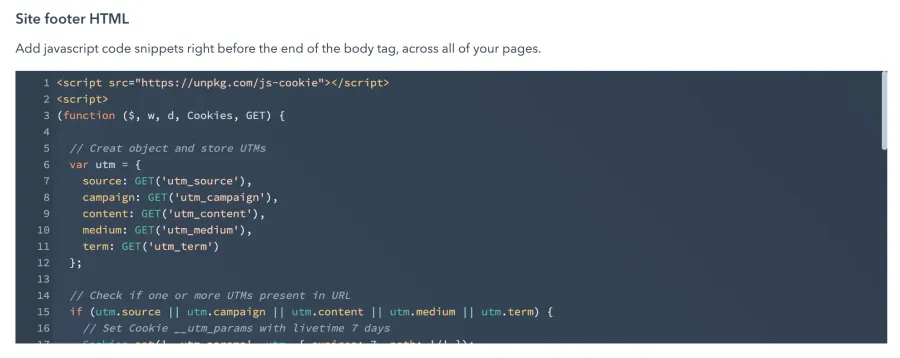Keep Track UTM parameters for HubSpot forms like Cookie Monster
About a week ago, I outlined step-by-step how to track UTMs across session and populate HubSpot forms even the visitor already left the target page and after checking other website pages decided to finish a form and submit application.
This time I will explain how we can do the same with cookies and store UTM parameters for a day, or week, or even more.
The downside of sessionStorage solution is when visitor close the browser tab, stored cookies will be gone.
Cookies # Anchor link
An HTTP cookie (web cookie, browser cookie) is a small piece of data that a server sends to a user’s web browser. The browser may store the cookie and send it back to the same server with later requests. Typically, an HTTP cookie is used to tell if two requests come from the same browser—keeping a user logged in, for example. It remembers stateful information for the stateless HTTP protocol.
From Web docs | MDN
I don’t want to “reinvent the wheel”, so we will use JavaScript Cookie library, and the easiest way to start work with this library get it from CDNJS.com. The snippet we can get and install to the footer of the website looks like this:
<script src="https://cdnjs.cloudflare.com/ajax/libs/js-cookie/2.2.1/js.cookie.min.js" referrerpolicy="no-referrer"></script>Or use the latest version with UnPKG.com
<script src="https://unpkg.com/js-cookie"></script>Next step let’s get the code from previous post and set them to use cookies instead of sessionStorage
(function ($, w, d, Cookies, GET) {
// Create object and store UTMs
var utm = {
source: GET('utm_source'),
campaign: GET('utm_campaign'),
content: GET('utm_content'),
medium: GET('utm_medium'),
term: GET('utm_term')
};
// Check if one or more UTMs present in URL
if (utm.source || utm.campaign || utm.content || utm.medium || utm.term) {
// Set Cookie __utm_params with livetime period 7 days
Cookies.set('__utm_params', utm, {expires: 7, path: '/'});
}
// Check if UTM parameters stored in SessionStorage
if (Cookies.get('__utm-params')) {
// Parse UTMs from SessionStorage to JSON
var storedUTM = JSON.parse(Cookies.get('__utm-params'));
// Add Event Listener for `onFormReady` event
w.addEventListener('message', function (e) {
if (e.data.type === 'hsFormCallback' && e.data.eventName === 'onFormReady') {
// Find all HubSpot forms on the page
var scope = $(d).find('form[data-form-id]');
// Check if UTM parameter exists and populate form hidden input fields
if (storedUTM.source) {
scope.find('[name="utm_source"]').val(storedUTM.source).change();
}
if (storedUTM.campaign) {
scope.find('[name="utm_campaign"]').val(storedUTM.campaign).change();
}
if (storedUTM.content) {
scope.find('[name="utm_content"]').val(storedUTM.content).change();
}
if (storedUTM.medium) {
scope.find('[name="utm_medium"]').val(storedUTM.medium).change();
}
if (storedUTM.term) {
scope.find('[name="utm_term"]').val(storedUTM.term).change();
}
}
});
}
})(jQuery, window, document, Cookies, function (param, url) {
url = url ? url : window.location.href;
var vars = {};
url.replace(location.hash, '').replace(/[?&]+([^=&]+)=?([^&]*)?/gi, function (m, key, value) {
vars[key] = value !== void 0 ? value : '';
});
return typeof vars[param] !== 'undefined' ? vars[param] : '';
})Installation to HubSpot website # Anchor link
Open Settings > Website(sidebar) > Pages(sidebar) > Templates(tab) > Site footer HTML(section) and paste the final code to Site footer HTML editor between script tags
<script src="https://unpkg.com/js-cookie"></script>
<script>
(function(){
// do something
})();
</script>
Final result should look like screenshot
The same method could be used for any websites(Webflow, WordPress, Wix, Static, etc…) who use HubSpot forms.
May the 4th be with you,
Alex